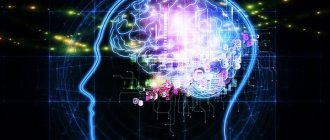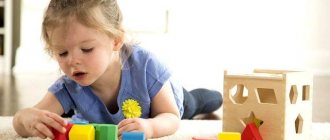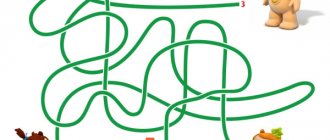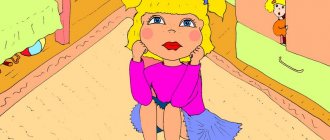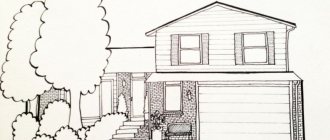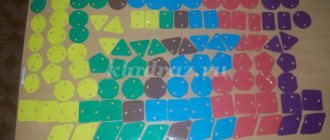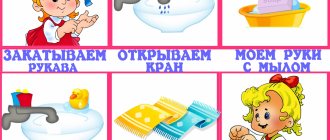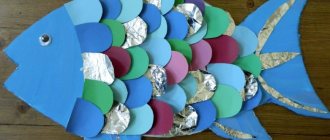Recommendations for the development of auditory memory in preschoolers
Pediatricians from all over the world recommend actively developing visual, motor, auditory, figurative and verbal memory from childhood. At the same time, do this at the same time, since all varieties are connected with each other and help in learning and personal growth. In order for a child to grow fully, parents should play with him and do various exercises. The program must take into account the characteristics of his age.
Auditory memory
It is important to achieve the child’s perseverance so that he can effectively remember different material. To achieve this, the following is recommended:
- Group material into classes with subgroups to reduce the load.
- Use associations so that you can easily learn the material and connect it with what you already know.
- Structure the material according to a logical and hierarchical principle so that it is perceived as a single whole.
- Add support points to the age program, that is, a certain plan. These can be dates with titles, names, unusual phrases and highlights.
- Connect schematic and graphic images so that visual memory develops simultaneously with auditory memory, and a logical chain of thoughts is established.
On a note! In addition, experts advise making the program varied and starting every day of class with interesting visual moments, including the child’s favorite cartoon characters, and doing a dictation with the placement of commas.
Peculiarities of memory of preschool children
Children of preschool age have involuntary memory and cannot yet remember something purposefully, by their own will or consciousness. Voluntary memory in preschoolers begins to form at the age of 7. For this reason, with a high probability, the child will be able to remember some bright and unusual moment, something that is not interesting to him.
It is important to note that during development, parents are faced with a lack of increased attention, the inability to teach their child to listen and stay still. Without concentration, it is difficult to achieve high-quality memorization of the first stories, poems, music and other things. To form voluntary memory, it is necessary that the baby is concentrated and knows how to listen.
Peculiarities
How to test a child's auditory memory
To test the auditory memory of a four- or five-year-old child, you don’t have to suffer for a long time and turn to specialists. Just run short tests. One of them is aimed at repeating words spoken in advance, and the other - numbers. When working with an older child, you can test his memory by letting him listen to a song or a story several times.
Luria's 10 words test
The Luria test is the best in psychology. Aimed at obtaining information about the level of development, the volume of memorization and fatigue. Also aimed at increasing attention. It can be used to test both preschoolers and adults.
Before conducting the test, you need to prepare 10 random words in advance. These can be phrases in the form of a chair, window, book, star, cat, plate, flowers, bedspread, plate and sun.
Educational games and activities for children 3 years old
On a note! These phrases must be read out within 20 seconds, pausing for 2 seconds. The child should listen to them carefully and try to remember the series.
After he listens to them, he needs to try to repeat all the words that he remembers. Then you need to repeat all the phrases 3 times, each time adding a new phrase, and each time record the words that the child was able to remember.
A preschooler with normal memory remembers 6 words after a set is read to him for the first time. The fourth time he says 8 words. For adults, the result is 7 words after the first reading and all words after the last. Later, this test can be improved by using more phrases or connecting pictures to them, turning the exercise into a kind of game.
Wechsler's Counting Test
The Wechsler test is similar to the Lurian test, but it uses numbers instead of words. The subject is asked to memorize 10 numbers, 3 numbers for the first stage. After repeating them, 3 more digits are added to the 3 numbers. The exercise is repeated until an error is made. In the second stage of the test, the test taker needs to remember the given numbers in reverse order. The normal indicator is 6 and 5 digits in the first and second stages, respectively.
Wechsler test
Types of memory
There are several types of memory, depending on the storage period of information, the object of memorization, the form of storing information in memory, etc.
By shelf life
- Instant memory is image memory. Perception of information by the senses, without any processing.
- Short-term. Quickly remember information for a short period of time. This could be a phone number, date, password, address.
- Long-term. Deep memorization of important details that can influence later life. It is formed by separating fragments from short-term memory and moving them by force of will into long-term memory.
By object of memorization
- Visual: retention and reproduction, if necessary, of visual symbols (memory of faces, etc.).
- Auditory: storing sound images and impressions.
- Tactile: retention of sensations obtained when touching something.
- Emotional: preserving the sensations obtained during a shock, a surge of feelings.
- Gustatory: remembering taste sensations.
- Olfactory: perception of smells.
- Motor, or motor: remembering, storing and reproducing various movements.
According to the form of storing information in memory
- Figurative: the brain has the ability to collect scraps of sensory impressions and create images based on them that provide a reference to the necessary information.
- Verbal-logical: remembering and reproducing thoughts in the process of thinking, thinking, reading books, etc.
On the participation of the will in memory processes
- Voluntary: with the application of effort and the formation of a specific goal. For example, when preparing for an exam.
- Involuntary: when information is stored in the head automatically.
On the participation of thinking in memory processes
- Mechanical: thorough memorization of information without one’s own associations and without resorting to personal experience.
- Logical: the main thing is the essence of what you need to remember, without cramming.
- Associative: Using personal experience to connect with new experiences.
Briefly, the information given above can be presented in the form of a table.
| Criterion | Types of memory |
| By information storage period |
|
| By object of memorization |
|
| According to the form of storing information in memory |
|
| On the participation of the will in memory processes |
|
| On the participation of thinking in memory processes |
|
Exercises for concentrating and developing auditory memory
In order for a child to learn to concentrate his attention on sounds and develop auditory memory, he needs to perform the following exercises to develop auditory memory:
- "Snowball". It is better to do it in pairs or in a team. One child names a word, the neighbor repeats and names another one. This continues until a mistake is made.
- "Bug". A chessboard is set up and a beetle figurine is placed on it. An adult gives the child commands to move the beetle and the child remembers them. Then it plays.
- "What color". Take a coloring book with a prepared plot. The parent reads the story and invites the preschooler to color the figures in accordance with the indicated colors in the story.
- "Story". A game of continuation of phrases. It consists of the following: the adult begins the story, the child continues, and so on. At the end, the players try together to remember what happened in the story.
- "Associations". Different pictures are laid out in front of the subject. Different words are spoken, and he tries to combine what he heard with what he saw.
On a note! To improve memory in children, you can turn on audio cassettes with songs and let the child listen to them several times, and then ask them to repeat and write.
Short and simple poems will also help. Subsequently they can be difficult. They can turn out to be operational tools for learning and increasing the level of memorization.
Listening to sounds
Listening to sounds and remembering them is the best way to develop memory, starting at age 2. At the beginning, these can be sounds of nature, then - complex exercises, according to which the preschooler must repeat them in turn, randomly and in the opposite order. Subsequently, these can be complex names of classical melodies that are played in the theater.
Communicative development of preschool children
Reading aloud
Reading aloud develops not only visual and abstract memory, but also auditory memory. It helps improve vocabulary and spelling. To develop concentration in this way, you can not just read fairy tales and stories, but also memorize individual phrases by trying to repeat them.
On a note! Interestingly, reading aloud in younger groups helps improve concentration. Therefore, meeting children of the same age is useful for thinking.
Learning poems
Poems are an excellent method for improving visual and auditory memory and imagination. At the beginning, with a 3-4 year old boy or girl, it is better to memorize short quatrains. Then move on to more serious classical works. It is important that the poems are accompanied by vivid material. Then, through abstraction and visual perception, the reader will be able to remember more and learn not only to mindlessly pronounce memorized Russian and English words, but also to try to understand their essence.
Depending on the required final result
The final result is of two types - recognition and reproduction. If you need to feel the same music well and clearly understand where the other person is out of tune and where not, then you need to listen to the melody many times. The same applies to other types of auditory information.
But you won't be able to reproduce it. This is why there are so many brilliant pianists who sing terribly. Why? Because they didn't learn how to play a melody. No matter how many times they listen to it, it will still be of no use. They have a brilliant musical memory, but they will not learn to sing until they begin to try to reproduce the melody with their voice themselves.
To develop auditory memory for reproducing information, you need to train to restore it, nothing else. And you can do it mentally. In sports there is such a thing as ideomotor training. This is when a person imagines in his head how he performs exercises, and his results improve in real training.
In the case of music, you need to start by hitting one note. Then do all the same exercises from the solfeggio course, but not for recognition (say, for example, what triad), but for reproduction (sing it). At first, you can sing along with the source (if you want to develop musical memory, be sure to learn to play the piano, this skill will help a lot, even if your goal is vocals), and then try from memory.
You can check how correctly you reproduced it using a tuner. It can be purchased or downloaded as an application on any smartphone. It will tell you what note you are singing and display any errors.
The same is true with other types of auditory information. If you want to skillfully tell jokes you heard on TV, reproduce them from memory as many times as necessary to make them bounce off your teeth. The secret formula is the more, the better. That is, if you have told a joke a hundred times, and will tell it a hundred more, learn not only to blindly reproduce it, but also to come up with your own jokes based on this one. They themselves will be born in the right situation, you will see.
Considering that it is for the reproduction of information that people want to train auditory memory, then the task must be set accordingly.
Depending on the fidelity
If accurate reproduction of information is required, then the only method is repeated repetition. Moreover, this is not necessarily cramming (although this method is also effective over long periods) of the necessary material (an anecdote heard on TV), but also repeated reproduction of information with its logical and emotional comprehension.
For example, you can accurately reproduce a joke only by rehearsing it many times. But at the same time you can add your emotions, your facial expressions. In general, approach learning creatively. This will increase the effectiveness of your learning, and you will be able to reproduce the joke more accurately.
In some cases, it is not necessary to reproduce the material exactly; it is enough to convey the key points. For example, you need to briefly retell the lecture. There is no need to quote the teacher verbatim, you just need to be able to tell what he talked about and what new things he learned.
In such cases, you need to try to logically process the material and pack it into a plan, and then remember it, which can be done with mnemonics - a set of techniques that make it easier to remember important information, based on the characteristics of the brain.
Results
So, summing up all that has been said, we can offer the following recommendations for training auditory memory:
- Decide on the area in which you are training. The ability to sing and the skill of easily retelling heard jokes are trained separately, although both abilities are associated with auditory memory.
- If the goal is to understand the intricacies of the material heard without the need to reproduce it (for example, for a deeper and more emotional perception of the music), then you need to listen to it repeatedly. After acquiring the last skill, you will be able to repeat what you heard without additional training. Example - could you tell a joke without learning how to speak?
- To roughly memorize lectures, you can use mnemonics, with the help of which you can firmly memorize the key points of the material you heard.
When training your auditory memory, follow these important principles:
- From simple to complex. Everything has its time. Learn based on what you can do, not what you can't.
- The law of the transition of quantity to quality. The more time you spend studying the material, the more times you repeat it, the better it will be remembered, and it will also become easier to retain other information from this area in your memory.
- The reason for poor listening memory is problems with attention. Therefore, the development of auditory memory in a child, adult and older people is based on the ability to concentrate on listening material for a long time. This skill can be trained well through meditation.
Remember: nothing is complicated. All difficult tasks can be reduced to simpler actions. And they are already easy to do. Good luck.
